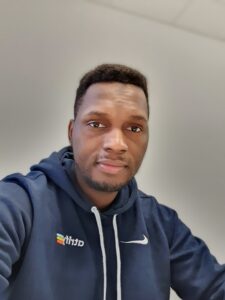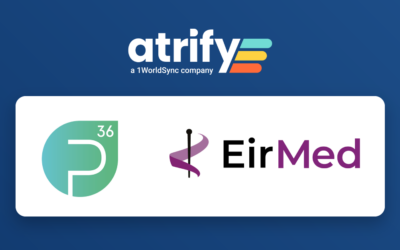In September 2018, Faad joined atrify as a working student in the Professional Services department. Last year, he decided to write his Master thesis in collaboration with atrify and he also started to work full time as a Software Engineer. Recently, Faad has completed his studies and he has received his Master’s degree in Engineering. We would like to congratulate him on this great success and we are very happy to have him on board as a full-time employee in our Professional Services team!
Below, you can read more about Faad’s experiences during his time as a student and about his job at atrify:
Congratulations on your Master’s degree, Faad! Which university did you go to and what was your focus during your studies?
Faad Sayaou (FS): I studied Embedded Systems for mechatronics at Fachhochschule Dortmund. The study program focused on software modeling of systems, implementing algorithms for distributed systems, evaluating and using tools for embedded software engineering and also how to lead cross-domain designs for mechatronics systems.
What have you learned from your work at atrify and how did it help you during your studies (or vice versa)?
FS: The mentorship provided by both Ameur and Stefan Hackauf permitted me to gain some project management skills during the course of my studies and thesis. The C# skills and docker knowledge acquired from my job at atrify acted as a basis to complete one of my last semester projects in IoT. The collaborative nature of my job made it possible for me to be proactive in semester projects. Before starting as a working student, my study program also introduced me to cloud systems and this enabled me to understand what atrify does on a global level.
What was the topic of your Master thesis and why did you decide to collaborate with atrify while writing your thesis?
FS: My topic was implementing a modular frontend architecture based on micro frontends (Microservices in frontend). This project was inspired by the current challenges faced by the frontend used in the custom solutions team. The idea of having a modular frontend architecture proved to be a potential solution for the custom solutions team. Collaborating with atrify to write my thesis was the right decision for me because it enabled me to gain practical experience as a working student, and it also contributed positively to improve the applications used by the custom solutions team.
What are your responsibilities as a Software Engineer in the Implementation team at atrify?
FS: My main responsibilities are:
– Developing custom solutions applications
– Creating DevOps pipelines for the custom solutions application via Jenkins
– Creation of documentations
– Third level support of custom solutions application
– Monitoring of the custom solutions environment
– Analyzing requirements for custom solutions application
What do you like most about working at atrify and how would you describe our culture?
FS: The employees are more than just coworkers and the friendly atmosphere makes it easy to integrate. There are lively conversations happening and so much to be learned and this encourages personal growth. I would describe the culture as collaborative with a vibrant working environment where there is collective hard work towards the objectives of the company.
Seit September 2018 ist Faad bei atrify als Werkstudent in der Abteilung Professional Services tätig. Letztes Jahr entschied er sich, seine Masterarbeit in Zusammenarbeit mit atrify zu schreiben, und er begann zudem, in Vollzeit als Software Engineer zu arbeiten. Kürzlich hat Faad sein Studium abgeschlossen und seinen Master-Abschluss in Engineering erhalten. Wir möchten ihm zu diesem großartigen Erfolg gratulieren und freuen uns sehr, ihn als Vollzeitmitarbeiter in unserem Professional Services Team an Bord zu haben!
Nachfolgend können Sie mehr über Faads Erfahrungen während seines Studiums und über seine Arbeit bei atrify lesen:
Herzlichen Glückwunsch zu deinem Master-Abschluss, Faad! An welcher Universität hast du studiert und was war dein Schwerpunkt während des Studiums?
Faad Sayaou (FS): Ich habe eingebettete Systeme für Mechatronik an der Fachhochschule Dortmund studiert. Das Studium konzentrierte sich auf die Softwaremodellierung von Systemen, die Implementierung von Algorithmen für verteilte Systeme, die Evaluierung und den Einsatz von Werkzeugen für Embedded Software Engineering und auch darauf, wie man domänenübergreifende Entwürfe für mechatronische Systeme leitet.
Was haben du durch dein Arbeit bei atrify gelernt und wie hat dir das während deines Studiums geholfen (oder umgekehrt)?
FS: Die Betreuung durch Ameur und Stefan Hackauf hat es mir ermöglicht, im Laufe meines Studiums und meiner Abschlussarbeit einige Projektmanagement-Fähigkeiten zu erwerben. Die C#-Kenntnisse und Docker-Kenntnisse, die ich bei meiner Arbeit bei atrify erworben habe, dienten als Grundlage für die Durchführung eines meiner letzten Semesterprojekte im Bereich IoT. Der kollaborative Charakter meines Jobs ermöglichte es mir, proaktiv an Semesterprojekten mitzuwirken. Bevor ich als Werkstudent anfing, lernte ich im Rahmen meines Studiums auch Cloud-Systeme kennen und konnte so verstehen, was atrify auf globaler Ebene macht.
Was war das Thema deiner Masterarbeit und warum hast du dich für eine Zusammenarbeit mit atrify bei der Erstellung deiner Arbeit entschieden?
FS: Mein Thema war die Implementierung einer modularen Frontend-Architektur auf Basis von Micro-Frontends (Microservices im Frontend). Dieses Projekt wurde durch die aktuellen Herausforderungen inspiriert, denen das Frontend des Teams für kundenspezifische Lösungen gegenübersteht. Die Idee einer modularen Frontend-Architektur erwies sich als mögliche Lösung für das Custom Solutions Team. Die Zusammenarbeit mit atrify bei der Erstellung meiner Diplomarbeit war für mich die richtige Entscheidung, da ich dadurch praktische Erfahrungen als Werkstudent sammeln konnte und gleichzeitig einen positiven Beitrag zur Verbesserung der vom Custom Solutions Team verwendeten Anwendungen geleistet habe.
Was sind deine Aufgaben als Software Engineer im Implementationsteam bei atrify?
FS: Meine Hauptaufgaben sind:
– Entwicklung von Anwendungen für kundenspezifische Lösungen
– Erstellung von DevOps-Pipelines für die kundenspezifischen Lösungen über Jenkins
– Erstellung von Dokumentationen
– Third-Level-Support für kundenspezifische Lösungen
– Überwachung der Umgebung für kundenspezifische Lösungen
– Analyse der Anforderungen für kundenspezifische Lösungen
Was gefällt dir am meisten an der Arbeit bei atrify und wie würden du unsere Kultur beschreiben?
FS: Die Mitarbeiter sind mehr als nur Kollegen und die freundliche Atmosphäre macht es einfach, sich zu integrieren. Es finden lebhafte Gespräche statt und es gibt so viel zu lernen, was die persönliche Entwicklung fördert. Ich würde die Kultur als kollaborativ beschreiben, mit einem lebendigen Arbeitsumfeld, in dem man gemeinsam hart an den Zielen des Unternehmens arbeitet.




